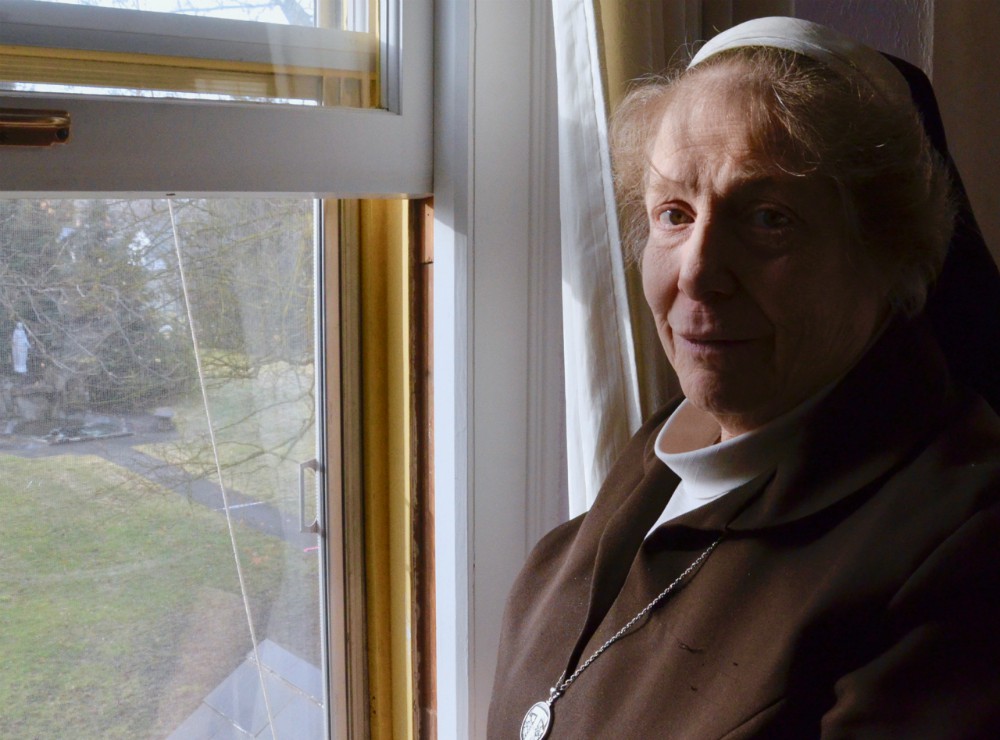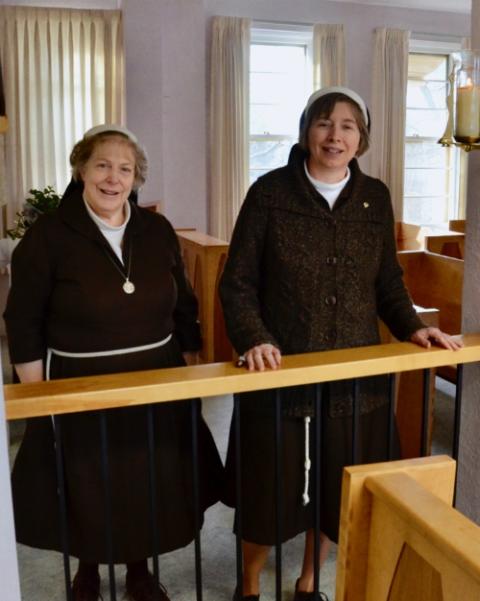
Sr. Marcia Kay LaCour, abbess of the Poor Clares in Spokane, Washington, at a window overlooking the grounds of the Monastery of St. Clare on Jan. 30 (GSR photo / Dan Stockman)
All is quiet both outside and inside the Monastery of St. Clare in Spokane, Washington. It's a cold weekday, and though the monastery is in a residential neighborhood, people are at work and children are in school, so the streets are empty.
The monastery, which covers a city block, is surrounded by a large concrete wall, and those who venture in the front door will find only an empty room with a telephone.

Sr. Marcia Kay LaCour, left, abbess of the Poor Clares in Spokane, Washington, and Sr. Colleen Byrne, the order's vicaress, in the chapel of the Monastery of St. Clare on Jan. 30 (GSR photo / Dan Stockman)
But the voice on the phone when you pick it up is full of joy, and soon Sr. Marcia Kay LaCour, abbess of the Poor Clares in Spokane, is inviting you to a small sitting room next door, where she sits behind a low wrought-iron railing like you might see on a porch.
From the outside, it might appear that the cloistered life is closed off from the world, and in many physical ways, it is. But it is also deeply connected to the world in ways not always visible.
First, there is the website, filled with photos of life in the monastery, explanations of the monastic life and answers to things the six sisters know people are curious about, such as their schedule and what it means to live a life of prayer. It also has a gallery of "holy e-cards," and users can send links to the half-dozen books that Poor Clare Sr. Patricia Proctor has written.
There is also Sacred Heart Radio, the 24-hour Catholic radio station the monastery is home to. Laypeople run the station, but the nuns are sometimes called on to clear snow from the satellite dish or reset equipment that's gone offline.
And there is the door: People from all stations of life appear with questions, with prayer requests, or with empty bellies needing food.
GSR: Most people might be surprised to hear of all of these things, assuming you are cut off from the world.
LaCour: These are our ways of sharing the Gospel. But basically, we're a prayer presence. When people are in some of the worst scenarios of their life, they want to ask God for help, and sometimes, they don't know how to do that. So they come here for help.
We have all these symbols of separation to represent our life of prayer, but those that need it find their way in, believe me. Neighborhood kids come in and say, "What is this place?" So we tell them. A man read a book about nuns, and then he came here to find out more.
A lot of contemplatives have only an answering machine, but we decided we wanted that contact. We answer our phone all the time, but not during Mass or prayer.
Advertisement
How do you find that balance between staying connected to the world while being apart from it?
While we're having supper, we watch the evening news so we can see what's going on in the universe and know what to pray for.
Our schedule is built around prayer. We get up, depending on what's happening that day, at 5 or 6 a.m. and have morning prayer. At 8 is Mass, then breakfast. Then the work of the day starts, depending on what your role in the monastery is. And there's always doctor appointments and errands. There's no such thing as an ordinary day.
There's also midday prayer, evening prayer and night prayer, plus any individual study and prayer.
So your life of prayer never gets boring?
We all wear many hats, since we're only six people. There's no shortage of things to do in a monastery.
We normally have a dog, but she died. But we have two cats, Mocha Latte and Salem.
I think many people would be surprised to find so much joy behind cloister walls.
Whatever happens during the day is what God wants to happen to you. You can either argue about it or you can thank God. We're thankful.
[Dan Stockman is national correspondent for Global Sisters Report. His email address is [email protected]. Follow him on Twitter or on Facebook.]





